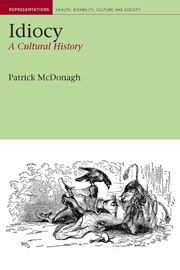Book contents
- Frontmatter
- Contents
- Preface and acknowledgements
- 1 Introduction: idiocy, culture and human relations
- 2 ‘Stripping our own hearts naked’: William Wordsworth and John Wilson read ‘The Idiot Boy’
- 3 A ‘pupil of innocent Nature!’ The wild boy of Aveyron goes to Paris
- 4 Diminished men: masculinity and idiocy
- 5 Essential women: femininity and idiocy
- 6 Holy fools, witty fools, depraved fools: folly, innocence and sin
- 7 History, society, economy: holy fools and idiots come home in nineteenth-century literature
- 8 Barnaby Rudge, idiocy and paternalism: assisting the ‘poor idiot’
- 9 Innocence, philanthropy and economics: the new ‘asylum’ idiot
- 10 Sensational idiocy
- 11 ‘The sins of the fathers’: idiocy, evolution and degeneration
- 12 Danger and degeneracy: the threat of the urban idiot
- 13 The problem of the feeble-minded: the Royal Commission, eugenics and eternal chaos
- Epilogue
- Bibliography
- Index
Preface and acknowledgements
- Frontmatter
- Contents
- Preface and acknowledgements
- 1 Introduction: idiocy, culture and human relations
- 2 ‘Stripping our own hearts naked’: William Wordsworth and John Wilson read ‘The Idiot Boy’
- 3 A ‘pupil of innocent Nature!’ The wild boy of Aveyron goes to Paris
- 4 Diminished men: masculinity and idiocy
- 5 Essential women: femininity and idiocy
- 6 Holy fools, witty fools, depraved fools: folly, innocence and sin
- 7 History, society, economy: holy fools and idiots come home in nineteenth-century literature
- 8 Barnaby Rudge, idiocy and paternalism: assisting the ‘poor idiot’
- 9 Innocence, philanthropy and economics: the new ‘asylum’ idiot
- 10 Sensational idiocy
- 11 ‘The sins of the fathers’: idiocy, evolution and degeneration
- 12 Danger and degeneracy: the threat of the urban idiot
- 13 The problem of the feeble-minded: the Royal Commission, eugenics and eternal chaos
- Epilogue
- Bibliography
- Index
Summary
In the middle of the 1980s, the provincial government of British Columbia, on the west coast of Canada, decided to shut down Woodlands, a large institution located in New Westminster, a suburb of Vancouver. Woodlands had been created in 1878 as the Provincial Lunatic Asylum, and in 1950 became a residential institution for several thousand people identified as ‘mentally defective’ (and, later, ‘retarded’). By the 1980s, though, the community-living movement had been making effective cases against large institutions like Woodlands, and at any rate the growth of Vancouver meant that the institution's location was much more valuable as the future site of high-density living (a fate that also overtook Woodland's close neighbour, the BC Penitentiary). At the time, I had been working with the Dunbar Autistic Youth (DAY) programme for three or four years and, with my co-workers in this programme, including Susan (Stanfield) Kurliak and Ernie Baatz, had become aware that young adults diagnosed as autistic had few long-term community-living support options available to them. Eventually Susan, Ernie and I decided to form the Spectrum Association for Community Living, and enlisted co-workers and parents as early board members. We incorporated in April 1987, and quickly found that we were not going to be providing services for autistic youths as we had anticipated – the government contracts were simply not awarded according to such criteria.
- Type
- Chapter
- Information
- IdiocyA Cultural History, pp. ix - xivPublisher: Liverpool University PressPrint publication year: 2008

